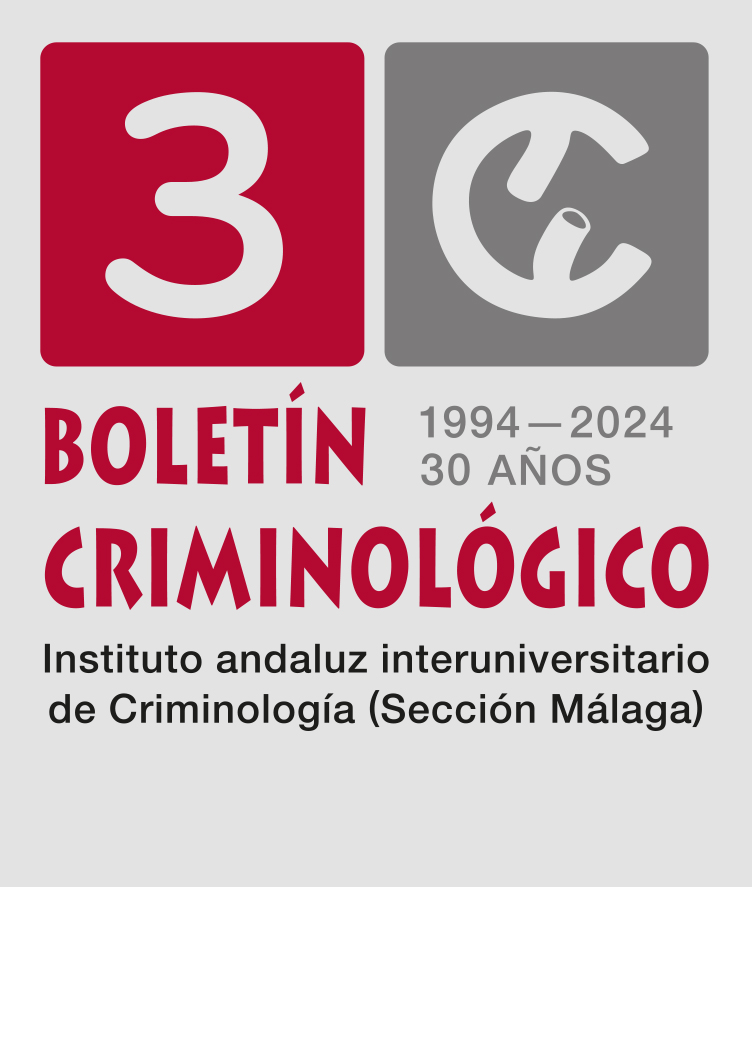“Thirty years of Boletín Criminológico: beginnings and consolidation”
DOI:
https://doi.org/10.24310/bc.30.2024.20669Keywords:
Criminology in Spain, scientific journal, empirical research, quality indicatorsAbstract
In June 1994, the first issue of Boletín Criminológico was published with the aim of disseminating empirical research in Criminology, a discipline that at that time was in its beginnings in Spain. The journal was born as a tool to publicize the empirical research conducted mainly in the Malaga section of the Andalusian Interuniversity Institute of Criminology (IAIC), but it soon expanded its scope, including works by researchers from all over the country and, gradually, from abroad, offering a space for the publication of papers of both academic and professional fields, and consolidating itself as a reference in Criminology in Spain. Thirty years have passed since those first issues began to be published on paper, in a format of 4 pages in triple column, very convenient for quick consultation of the contents and which has undergone several changes until its current digital format approved in length and content to the requirements of the evaluation agencies of research quality. Throughout these three decades, more than 200 articles on a wide range of topics have been published, with special emphasis on empirical criminological research carried out in Spain and Latin America. This article is the introduction to a special issue that celebrates this milestone with the participation of people who have collaborated with the journal over the years, publishing their research, being part of its editorial board or acting as external reviewers, all of them with consolidated and prestigious academic or professional careers. After recalling the journal’s beginnings
until its consolidation as a reference publication in an expanding area of knowledge, this article presents data on the evolution of the journal (topics covered, origin of authors, profile of readers, evolution of the format and design of the publication, as well as
its impact and quality indicators) and raises the challenges that lie ahead to address the current and future challenges of criminological research today.
Downloads
Metrics
References
DÍEZ RIPOLLÉS, José Luis (2018): “La implantación de los estudios oficiales de criminología en España”, en De la Cuesta Aguado, Paz; Ruiz Rodríguez, Juan Ramón; Acale Sánchez, María; et al. (coords.): Liber amicorum. Estudios jurídicos en homenaje al Prof. Juan Mª Terradillos Basoco, Valencia: Tirant lo Blanch, pp. 61-77.
GARCÍA MAGNA, Deborah; AGUILAR CONDE, Araceli (2014): “20 años del Boletín Criminológico. Logros y retos”, en Boletín Criminológico, artículo 3/2014 (nº150).
SERRANO MAÍLLO, Alfonso (2018): Un estudio sobre la formación de la criminología española (1903-1978), Cizur Menor: Thomson Reuters Aranzadi.
Downloads
Published
How to Cite
Issue
Section
License
Copyright (c) 2024 Boletín Criminológico

This work is licensed under a Creative Commons Attribution-NonCommercial 4.0 International License.
Con la aceptación de este aviso el/los autor/es declara/n:
- Que el artículo se deriva de una investigación propia, que no ha sido publicado en el mismo formato que se presenta y que no está siendo objeto de postulación para su publicación en otra revista simultáneamente y con el mismo formato.
- Que acepta/n someter a evaluación el artículo, y a proceder en el término establecido a las correcciones que se indiquen, como condición para su publicación.
- Que existe conformidad con la política editorial de la revista Boletín Criminológico en lo relativo a la difusión de sus contenidos por correo electrónico en el formato pdf, y a través de su página web y de los directorios de revistas en los que está indizada .
- Que a tal efecto, por la presente el/los autor/es cede/n los derechos de difusión y reproducción del artículo presentado al Boletín Criminológico para todas las ediciones de la revista.
La revista se publica bajo el sistema de licencias Creative Commons según la modalidad «Reconocimiento – NoComercial (by-nc): Se permite la generación de obras derivadas siempre que no se haga un uso comercial. Tampoco se puede utilizar la obra original con finalidades comerciales». La revista se publica y se gestiona mediante el software Open Journal Systems.







3.png)
